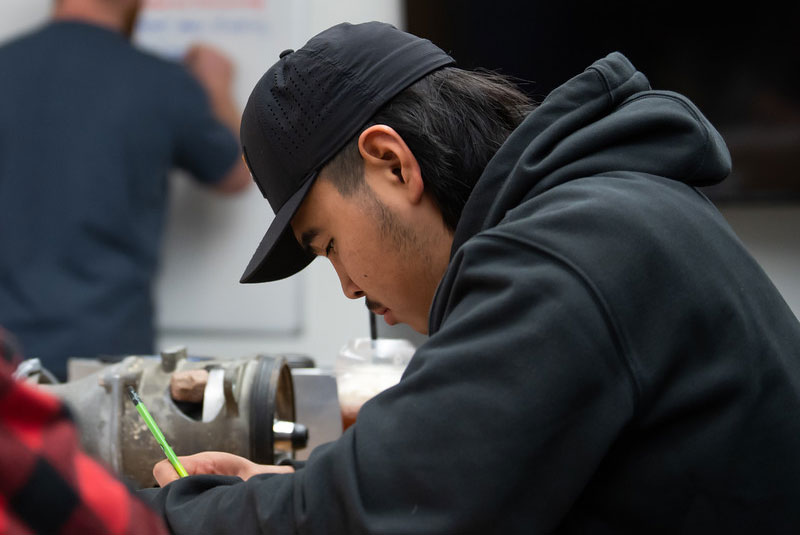Climbing Higher: PWSC Students Prepare for Capstone Expedition to Denali, North America's Highest Peak.
by V. Heisser |
At Prince William Sound College, there’s a unique sense of anticipation in the air—a
mix of nerves, ambition, and excitement. A group of students is gearing up for a capstone
expedition to Denali, North America's highest peak. However, this adventure is more
than just a physical challenge; it serves as a scientific mission, a team-building
experience, and, for many, a defining moment in their academic and personal journeys.
The climb is only part of the story. As part of a larger research initiative supported
by NASA’s Minority Institution Research Opportunity (MIRO) program, the team will
collect and analyze snow and ice samples to investigate the presence of microplastics
in one of the most remote environments on Earth. Their efforts are guided by Dr. Dee
Barker, a NASA-funded researcher and associate professor at Alaska Pacific University
(APU). Earlier this year, Dr. Barker trained the students in field sampling techniques
and shared her expertise on how plastic pollution—once considered an issue limited
to urban or coastal areas—has infiltrated even the most isolated alpine ecosystems.
With her ongoing mentorship and her lab serving as the central hub for analysis, the
students are not only climbing Denali; they’re also contributing to the global conversation
on environmental health in an increasingly warming world.
For months, the team has been deeply engaged in meticulous planning and rigorous physical
preparation. Leading the expedition is instructor Benjamin Rush, who has been guiding
students through weekly meetings since January. The logistics involved are immense:
compiling gear lists, arranging travel, sourcing food, conducting risk assessments,
and navigating the lengthy process of securing permits from the National Park Service.
While the school provides some essentials—such as mountaineering tents, stoves, and
insulated jackets—the students are responsible for their gear, much of which can be
pretty expensive.
“Getting the gear has been the biggest stressor,” one student remarked. “There’s always
something more you need, and every single item is essential. Even a pair of gloves
can’t be overlooked.”
Boots alone can cost over $1,000, and since there is no one-size-fits-all solution,
each student must purchase their pair. Despite the expenses and challenges, the group's
spirits remain high. Each packed layer and fitted crampon brings them a step closer
to the summit.
As their departure approaches, the focus shifts to final training. A weekend trip
in early May will allow the group to practice rope systems, wind wall construction,
crevasse rescues, and crampon techniques in conditions as close to Denali’s as possible.
This time will be used to refine skills, troubleshoot gear, and reinforce group cohesion—because
on the mountain, trust is just as vital as equipment.
Food preparation is another challenge in its own right. Due to budget protocols, the
team cannot place their food orders until May 5. “We have everything sitting in carts—on
Amazon and local shops—ready to go,” said Rush. “Once we get the green light, we’ll
spend hours breaking it down and packaging it: 18 days’ worth of food for eight people.”
Fresh food will be packed at the last minute to avoid spoilage, adding another layer
of time-sensitive logistics.
The necessary permits have been secured for a long time, but the team still needs
to pass a final review with the National Park Service before flying to Base Camp.
This meeting involves a mix of formality and due diligence: proof of experience, safety
plans, and assurance that they are entirely self-sufficient. “We don’t have guides
or porters,” Rush explained. “We carry everything ourselves. Each person hauls a sled,
packs their gear, cooks, and climbs. This is real.”
The journey begins in Talkeetna, Alaska. From there, they will fly—weather permitting—to
the icy expanse of Denali Base Camp. What follows is a slow, calculated process of
acclimatization and upward progress. The climb will test every aspect of their training—physical
stamina, mental resilience, and the strength of their team bond.
For Lucas, one of the climbers, the idea of summiting Denali had been developing since
the previous summer. His training included long hikes, ski touring, and StairMaster
sessions. “I didn’t set strict goals,” he admitted. “I just stayed active. This kind
of adventure is rare—it’s fun, exciting, and something I’ve always wanted to do.”
Jane’s motivation ran just as deep. From the moment she arrived at PWSC in August,
she knew Denali was the peak experience she wanted. “It’s a once-in-a-lifetime opportunity,”
she said. “To climb Denali in a learning environment, where you’re not just along
for the ride—you’re learning every step of the way—is really special.”
Her training was intense: weighted StairMaster climbs with packs up to 55 pounds,
sled drags on local trails, and winter camping in Alaska’s rugged backcountry. “You
have to train like it’s the real thing because when we get out there, it is the real
thing,” she said. “No one’s going to do it for you.”
The stories of Lucas and Jane reflect the spirit of the entire team—a collective drive
to push boundaries, embrace discomfort, and grow through challenges. Their experience
on Denali will not just earn them a grade; it will reshape how they understand the
world and their place in it.
In just a few short weeks, these students will step onto the glacier at Base Camp
and begin a climb that will test everything they’ve learned. It will demand grit,
cooperation, and unwavering focus. However, it will also provide a perspective few
ever experience—the view where science, adventure, and self-discovery converge on
the roof of North America.









